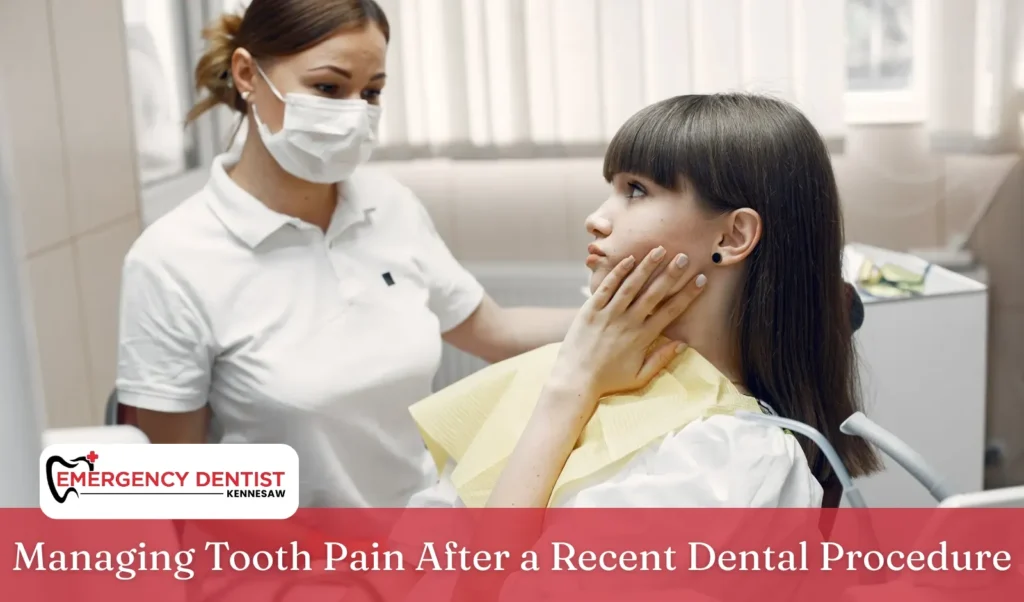Managing Tooth Pain After a Recent Dental Procedure

Discomfort after a dental procedure can be concerning, especially if you’re unsure what’s normal and what may signal a problem. Whether you’re experiencing tooth pain after filling, sensitivity following a crown, or discomfort from a tooth pulled, understanding the healing process and knowing when to act is crucial for your oral health.
In this guide, we’ll explore the common causes of post-procedure pain, signs of complications like gum disease or dry socket, and when to schedule an appointment with an emergency dentist in Kennesaw, GA.
1. Tooth Pain After Tooth Pulled: Is It Healing or a Dry Socket?

Mild discomfort around the extraction site is expected after a tooth removal. However, if the blood clot that forms to protect the area is lost too soon, it may result in dry socket, exposing bone and nerves and delaying recovery.
Watch for These Signs of Infection or Dry Socket:
- Sharp or worsening pain 2–3 days post-extraction
- Foul taste or odor
- Exposed bone in the socket
- Radiating pain to the jaw, ear, or neck
How to Support Healing:
- Avoid straws, smoking, and vigorous rinsing your mouth
- Stick to soft, lukewarm foods
- Rinse gently with salt water a few times a day
If pain persists or worsens, it’s essential to contact your dentist right away for professional pain relief.
2. Tooth Pain After Filling: What’s Normal?
Common to have some sensitivity to hot or cold foods following a dental filling, but sharp, lingering pain may indicate deeper issues such as:
- Misaligned bite
- Extensive tooth decay close to the nerve
- Irritated or inflamed pulp inside the affected tooth
What You Can Do:
- Use counter pain relievers like ibuprofen
- Avoid extreme temperatures in food and drinks
- Maintain proper oral health habits
Persistent pain may mean the tooth needs additional treatment like a root canal treatment. Don’t delay, schedule an appointment for evaluation.
3. Filling Tooth Pain After a Few Days: Could It Be Something Else?

If you’re still feeling filling tooth pain after several days, the issue might not be the tooth that was filled. Sometimes, pain is referred from another problem area in your mouth.
Other Potential Causes:
- A high or uneven dental filling
- A small fracture in the affected tooth
- Leaking filling allowing bacteria to cause decay
- Underlying gum disease
Home Remedies:
- Use desensitizing toothpaste as advised by your dentist
- Avoid chewing hard foods
- Continue rinsing your mouth with warm salt water regularly
Long-term discomfort isn’t normal, contacting your dentist will ensure you get the appropriate care.
4. Tooth Pain After Crown: When to Be Concerned

A properly placed crown should protect, not hurt, your tooth. If you’re experiencing tooth pain after crown placement, there could be issues such as:
- A crown that’s too high causing bite pressure
- Bacteria trapped beneath a poorly sealed crown
- Infection or advanced gum disease in surrounding tissues
Tips to Minimize Discomfort:
- Eat only soft foods for a few days
- Avoid extreme food and drink temperatures
- Take counter pain relievers if needed
If symptoms continue, schedule an appointment with your dentist , the crown may need adjustment or replacement.
At-Home Pain Relief Tips
While you wait to see your provider, these simple strategies can help:
- Take ibuprofen or acetaminophen for pain relief
- Apply a cold compress to reduce swelling
- Rinse your mouth with salt water 2–3 times a day
- Eat soft foods and avoid spicy, hot, or acidic items
- Stay well hydrated and avoid smoking
These measures can support the healing process and help you stay comfortable in the meantime.
When to Contact an Emergency Dentist in Kennesaw, GA

Some symptoms indicate the need for immediate care. Reach out to a dentist promptly if you notice:
- Pain that lasts more than 3–5 days after the dental procedure
- Swelling, fever, or other signs of infection
- Ongoing discomfort affecting sleep or eating
- Unusual discharge or worsening of symptoms
- Concerns about developing gum disease following treatment
An emergency dentist in Kennesaw can offer same-day treatment to help you feel better quickly and prevent complications.
Frequently Asked Questions
Is it normal to experience tooth pain after tooth pulled?
Yes, mild discomfort is expected. However, if pain worsens or you suspect dry socket, contact your dentist for prompt care.
How long should tooth pain after filling last?
Typically, discomfort resolves in a few days. If tooth pain after filling continues, you may need a bite adjustment or a root canal treatment.
Why is my filled tooth still hurting after a week?
Ongoing filling tooth pain after one week may indicate nerve involvement, tooth decay, or gum disease. Professional evaluation is recommended.
What can I do at home to relieve pain after getting a crown?
Stick to soft foods, use saltwater rinses, and take counter pain relievers. If tooth pain after crown persists, your dentist may need to adjust it.


